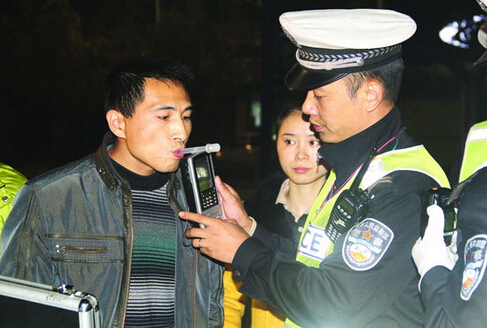Rehabilitation behind bars
- By Wei Jia and Jason Eder
 0 Comment(s)
0 Comment(s) Print
Print E-mail China.org.cn, July 7, 2015
E-mail China.org.cn, July 7, 2015
While the exact number is not easy to get, drunk driving is behind a slew of deadly traffic accidents in China. Cases involving celebrities who drove with bleary eyes made driving under the influence an issue that grabs the public's attention.
 |
|
A traffic police officer uses a breathalyzer to test a driver for traces of alcohol. |
To fight this problem that incurs great ire from the public, traffic authorities of the country has been keeping a zero-tolerance attitude to worst offenders of drunk driving laws, especially since May 1, 2011, when drunk driving (more than 80mg of alcohol in 100ml of the driver's blood, or 0.08% BAC) became punishable by the country's criminal law. Those caught drunk driving will serve between one and six months behind bars.
China maintains one of the stiffer penalties against drunk driving. Saudi Arabia, where alcohol is banned, will subject offenders to lashings in the public square. Russia will permanently revoke an offender's license forever on the first offense. France can revoke your car and at a minimum, install a breathalyzer. But none of these countries try to combat the root cause of drunk driving.
While the country's firm stance against drunk driving has proved effective, traffic authorities in Beijing have recently taken efforts a step further by attacking the problem at its roots.
A pilot program that began in April this year was aimed at treating addiction to alcohol. More than 40 drivers serving time on charges of endangering public safety after being caught drunk driving took part in the pilot program. Methods to rid those drivers of their addiction include group meetings, which relatives of the participants in the program also attended, and transcranial magnetic stimulation (TMS).
Research from Neural Regeneration Research found TMS to be a beneficial method of treatment for alcohol use disorder as well as mild traumatic brain injury and posttraumatic stress disorder. Additional research from the National Center for Biotechnology Information found TMS to have significant anti-craving effects in alcohol dependence.
Coupled with meetings mimicking AA, the government hopes to rid people of not only drunk driving, but drinking period.
Group meetings are a hallmark of interactional group psychotherapy at Alcoholics Anonymous, an international mutual aid fellowship founded in 1935. It remains the most well-known program for helping people with alcoholism. People attending AA group meetings generally share with each other their experiences as alcoholics, why they want to be free of addiction to alcohol, and most notably embark on the 12-step program.
The pilot program of treating some law-breaking drivers' addiction to alcohol rolled out in Beijing included similar sessions. Loved ones of the drivers were invited to make the scene more emotionally-charged in the hopes that the drivers will not relapse after their release from prison.
Judging by the feedback of some of the drivers who have participated in the program, the results of the initiative look promising. Xiao Gang, a 31-year-old driver put away for injuring a pedestrian and hitting a policeman after drunk driving, apologized tearfully to his wife during a group meeting for his erratic behaviors after getting drunk and promised he will never drink again.
That sounds like a good start.






Go to Forum >>0 Comment(s)